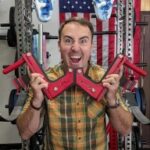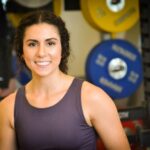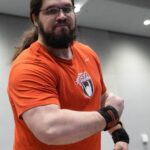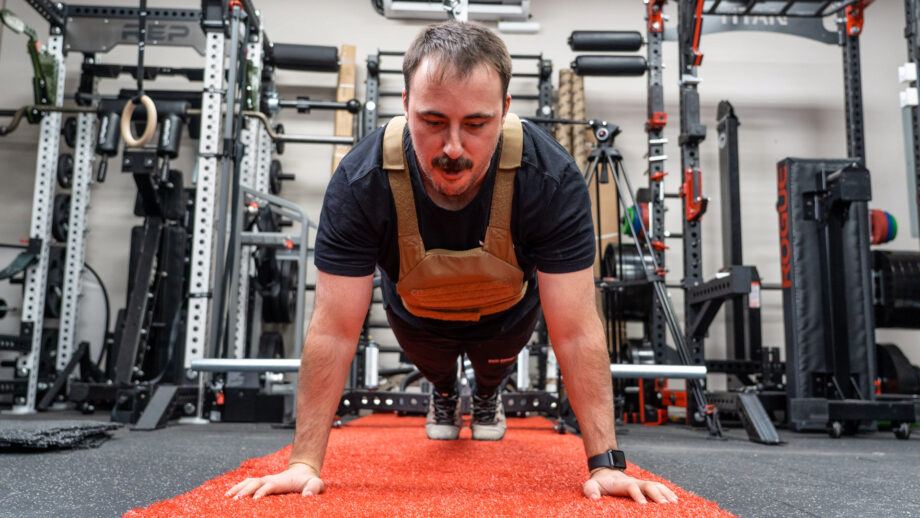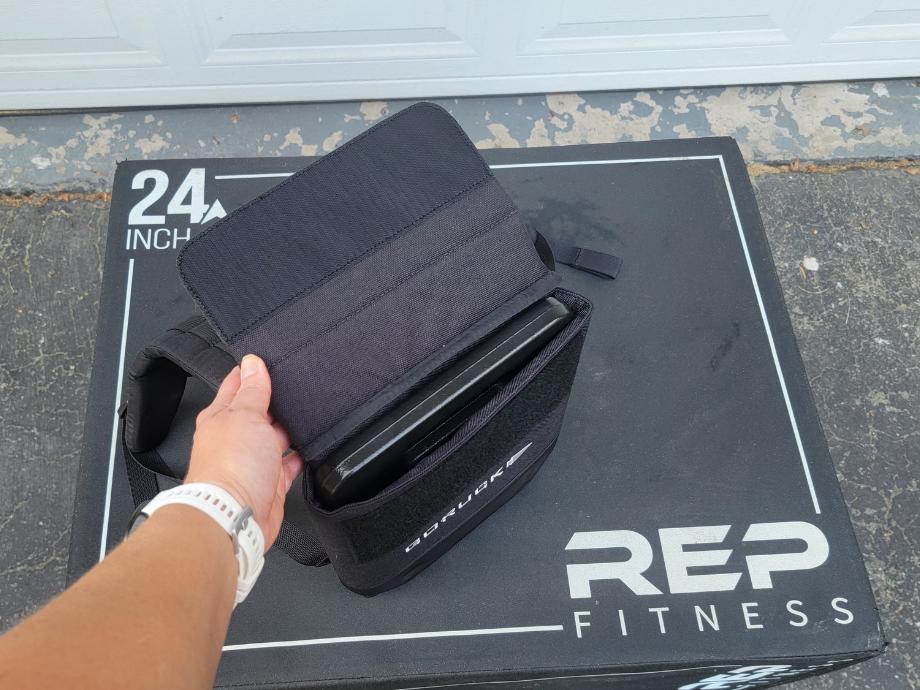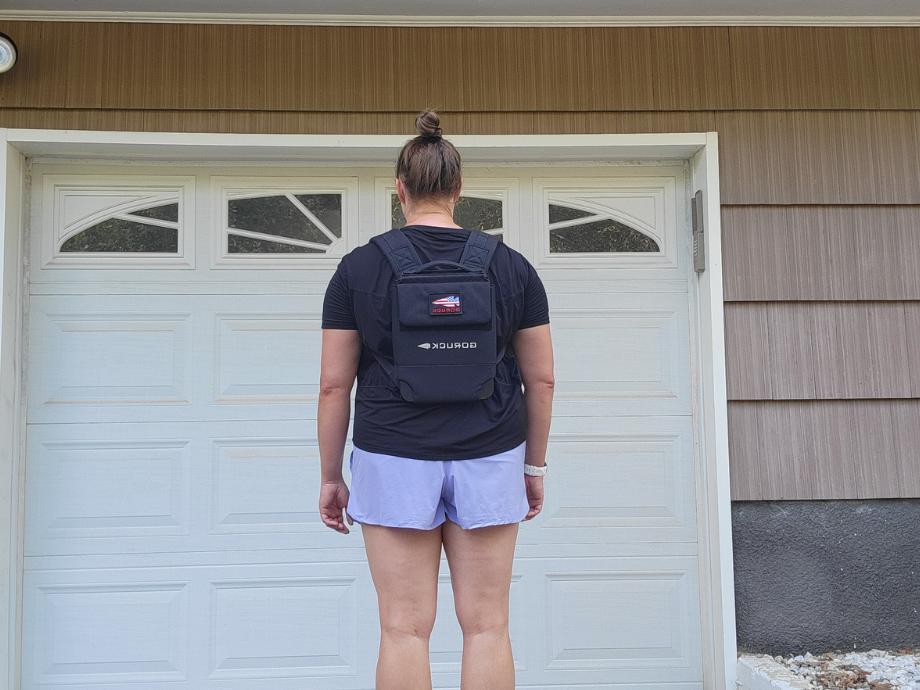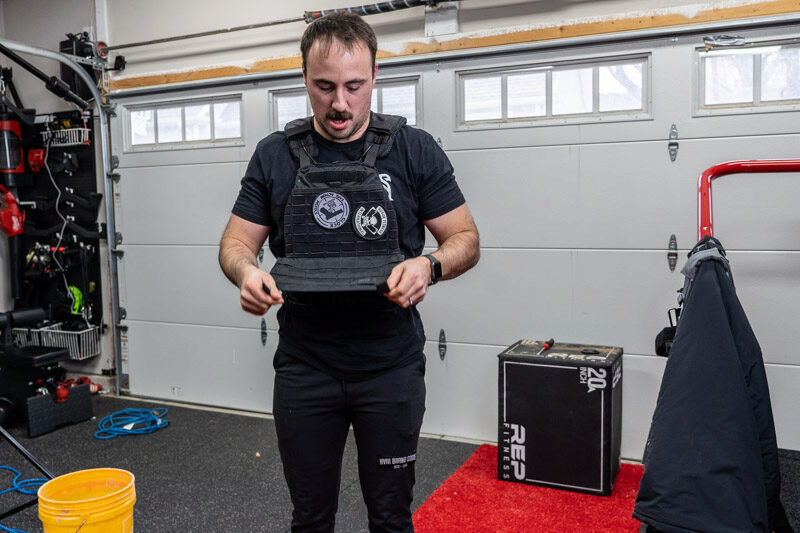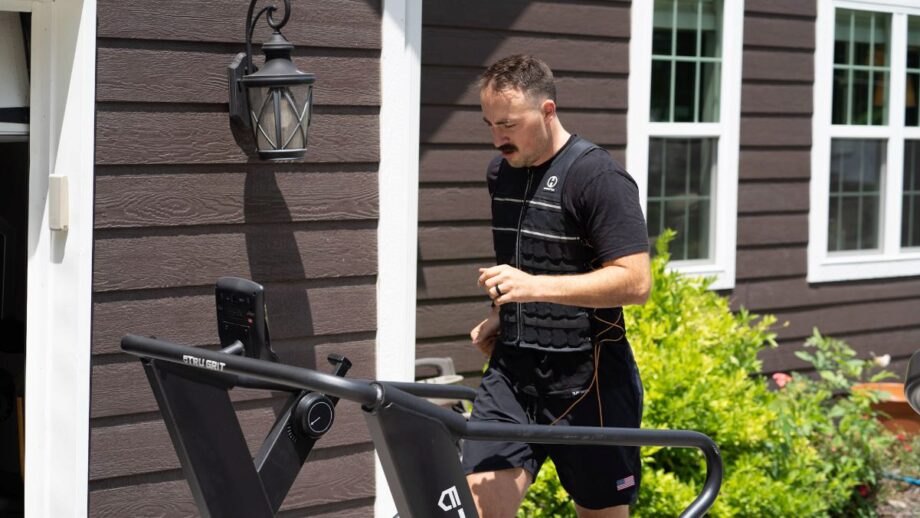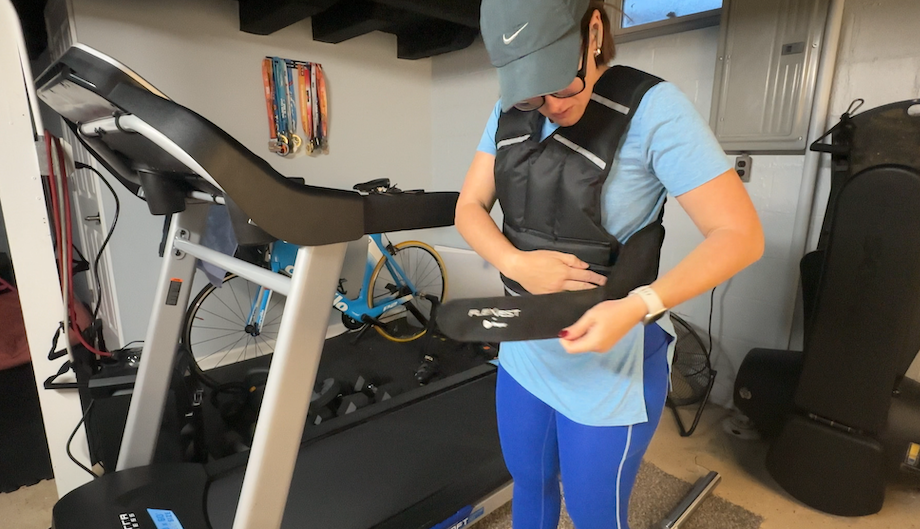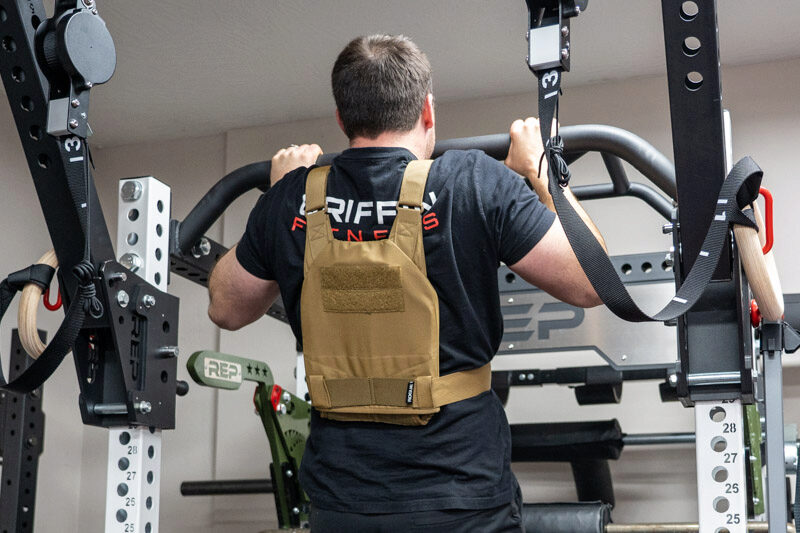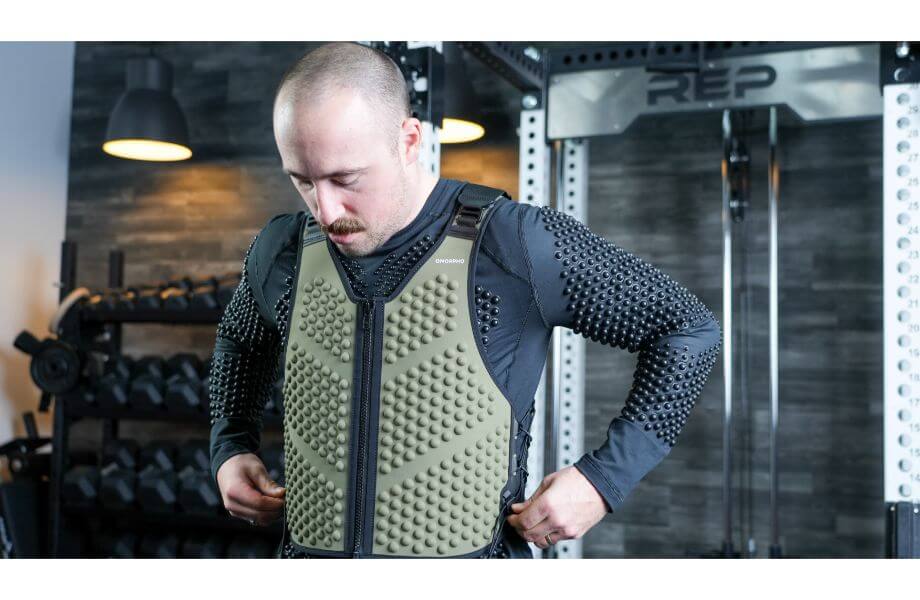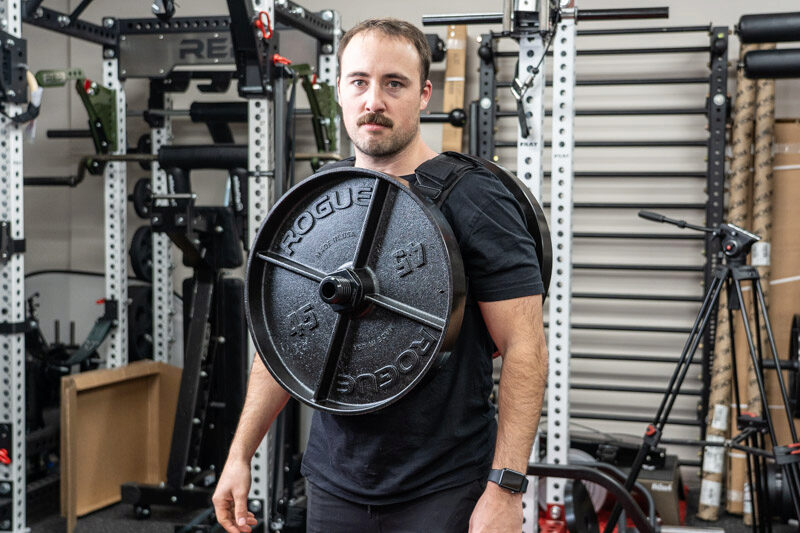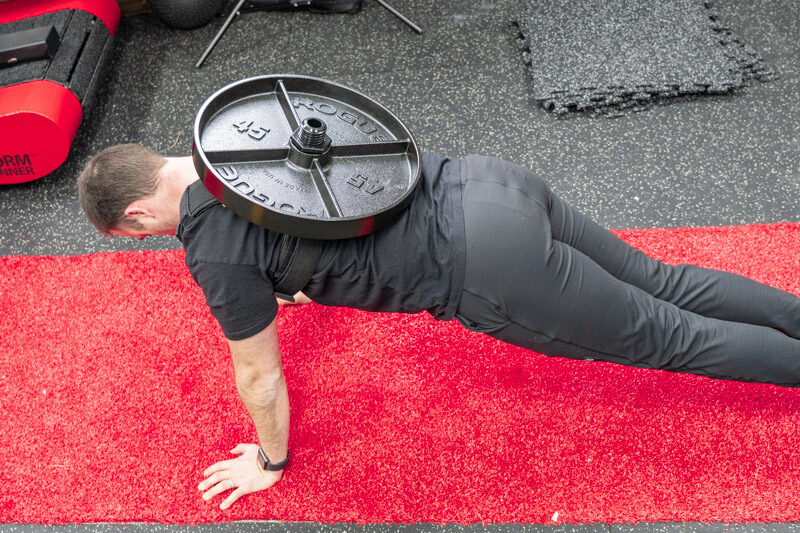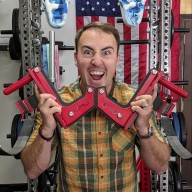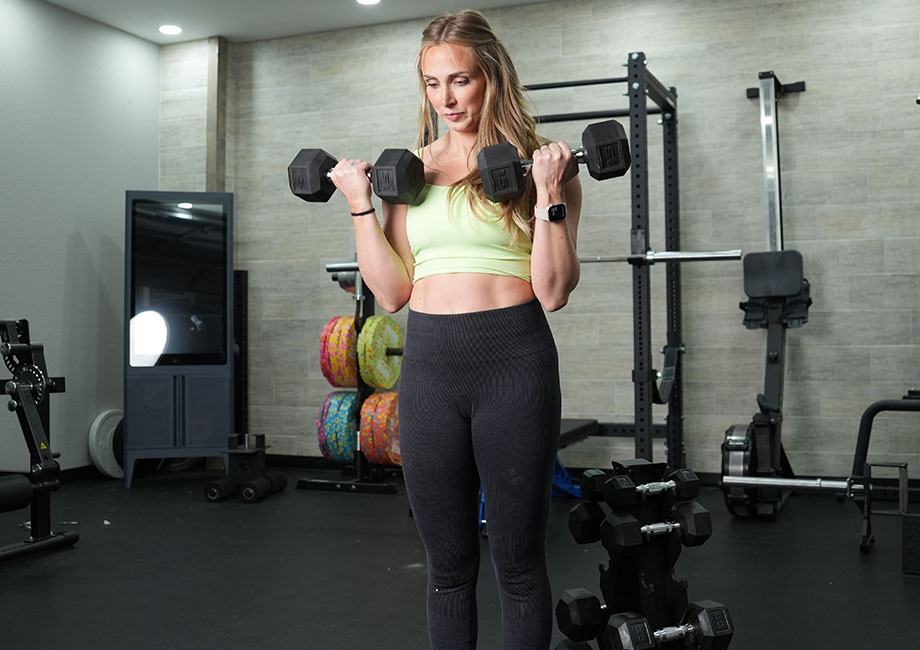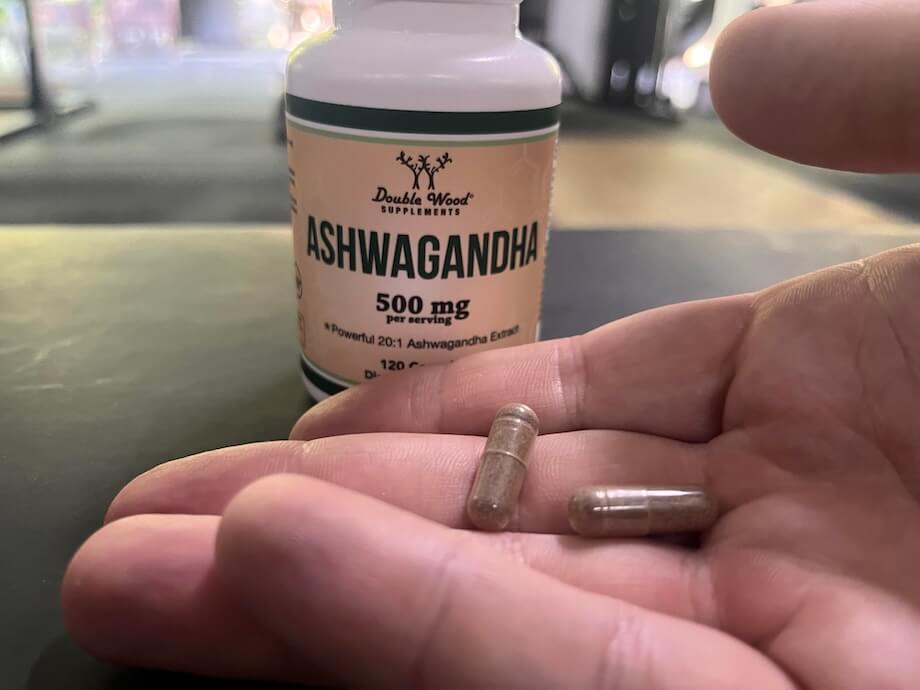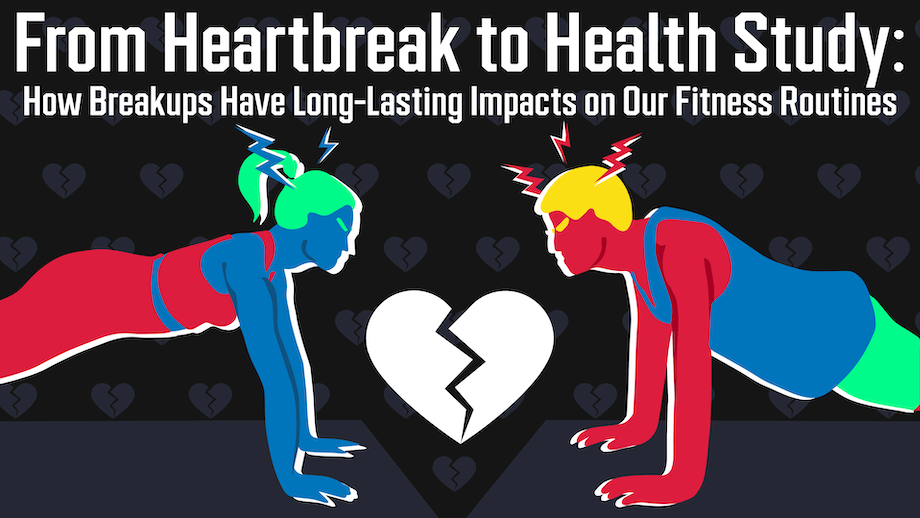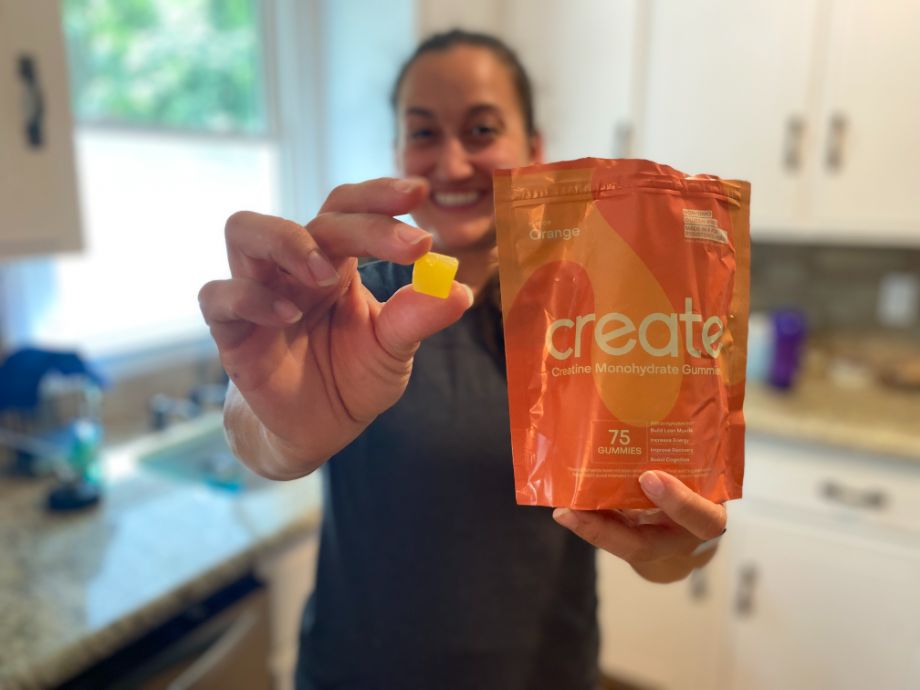If you’re looking for the best weighted vests, you’ve come to the right place. A weighted vest can take any workout from “eh” to “I might die” in a matter of minutes. All jokes aside, training with a weighted vest can improve your fitness—particularly your stamina and muscular endurance—by adding resistance to basic exercises like push-ups, squats, lunges, pull-ups, and running or walking.
Weight vests are a great way to increase the intensity of your workouts, especially if you’re looking for a relatively small and inexpensive piece of fitness equipment (compared to items like squat racks, Olympic barbells, and weight plates).
- Movement freedom: Are you restricted in any way?
- Breathability: Is it too hot to handle?
- Durability: Can it withstand wear and tear?
- Adjustability: Are there good sizing options?
We created a shortlist of weight vests we think are worth considering, and then ran those through a series of workouts. Not only were these products put to the test by myself and others on the Garage Gym Reviews team, but I’ve been interacting with and buying from most big fitness equipment brands for years. This means I have a pretty good sense of the customer experience and product quality you can expect from these brands.
The 10 Best Weighted Vests for 2025
- Best Weighted Vest Overall – GoRuck Ruck Plate Carrier 3.0
- Best Weighted Vest for CrossFit – 5.11 TacTec Plate Carrier
- Best Weighted Vest for Running – Hyperwear Hyper Vest Tactical Weighted Vest
- Best Weighted Vest for Beginners – LifePro Weighted FlexVest with Ankle Weights
- Best Weighted Vest for Walking – Fringe Sport WODmaster Weight Vest
- Best Adjustable Weighted Vest – Rogue Plate Carrier
- Best Budget Weighted Vest – CAP Adjustable Weighted Vest
- Best Premium Weighted Vest – OMORPHO G-Vest+
- Best Weighted Vest for Women – Hyperwear Hyper Vest Fit
- Best Heavy Weighted Vest – Kensui EZ-Vest
Best Weighted Vest Video Review

Best Weighted Vest Overall: GORUCK Plate Carrier 3.0
Good for: Exercisers who want to consolidate the weight to their back and keep their chest free of constriction
Best Backpack-Style Weighted Vest
GoRuck Ruck Plate Carrier 3.0
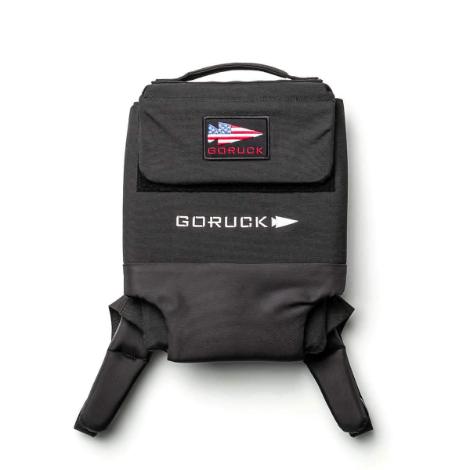
Product Highlights
- Backpack design leaves your chest open
- Lumbar padding makes for a comfortable fit
- Made of durable Cordura fabric
Pros & Cons
Pros
- Backpack design leaves your chest open
- Lumbar padding makes for a comfortable fit
- Made of durable Cordura fabric
Cons
- Kind of defeats the purpose of weight vests, which is to evenly distribute weight
- Not everyone will like the backpack-style straps
- Could use a hip strap in addition to the sternum strap
Bottom Line
The GORUCK Ruck Plate Carrier 3.0 purposely centers the entire load on your back and leaves the chest and abdomen open in this backpack-style vest.
Best Weighted Vest for CrossFit: 5.11 TacTec Plate Carrier
Good for: People who need an ultra-durable weighted vest for long-term wear
Best Weighted Vest for CrossFit
5.11 TacTec Plate Carrier
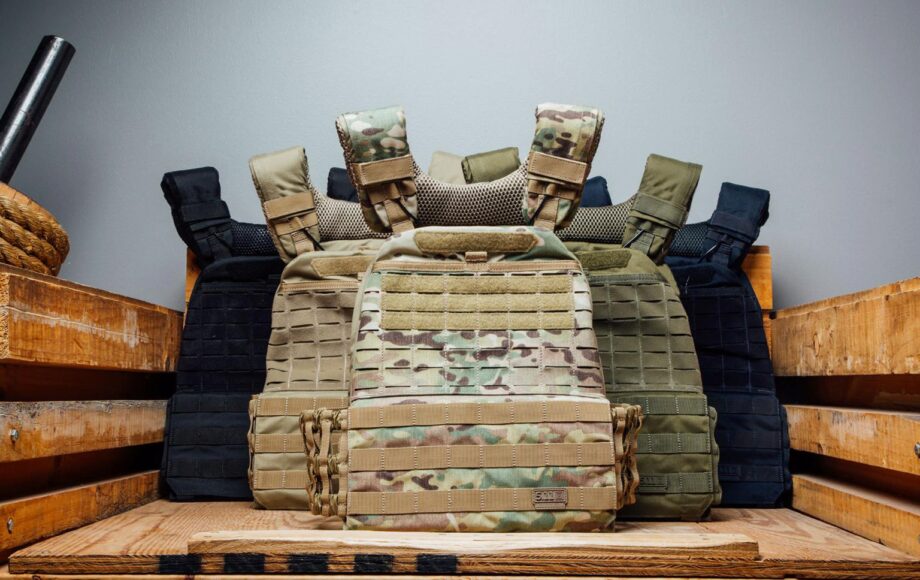
Product Highlights
- Made from an ultra-durable, water-resistant 500D nylon
- Uniquely designed to give the wearer an increased range of motion
- Breathable
Pros & Cons
Pros
- Designed to give user increased range of motion
- Can hold plates in front and back
- Shoulder pads reduce friction
Cons
- Weight plates can make it expensive
- Vest costs more than $200
- Cut very tight
Bottom Line
The 5.11 Vest does a great job of providing breathability, comfort, and a secure lockdown for the vest we believe is the best available.
Best Weighted Vest for Running: Hyperwear Hyper Vest Elite Weight Vest
Good for: Anyone who needs to minimize jostling and shifting of their weight vest while running.
Best Fitted Weight Vest
Hyper Vest Elite
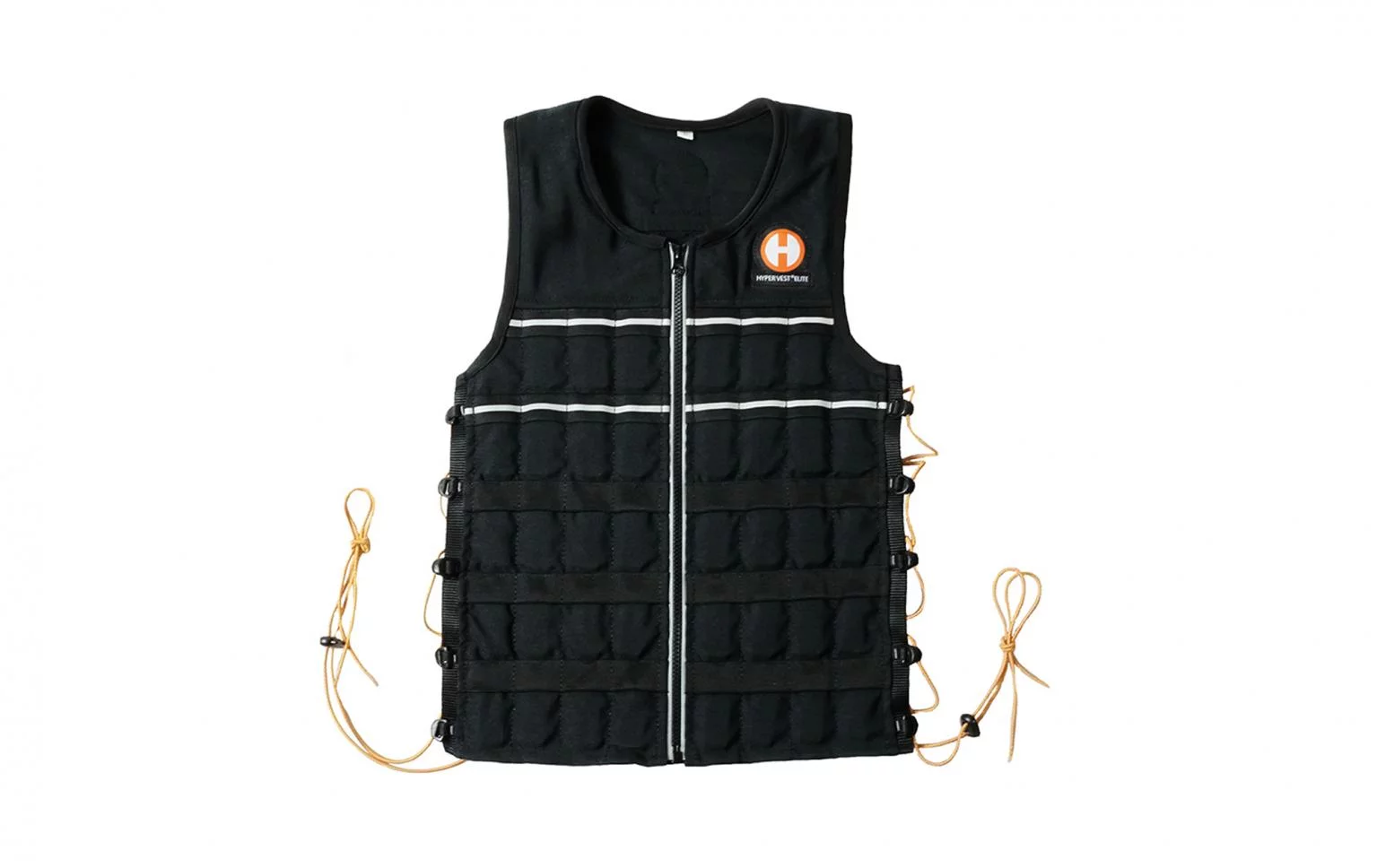
Product Highlights
- Lightweight, breathable fabric
- Unisex design for comfort
- Breathable, odor-resistant, wicking Cordura fabric
- Reflective, flexible side lacing for highly-adjustable fit
- Small available in 10LB or 15LB – M,L, and XL available in 10LB or 20LB
Pros & Cons
Pros
- Lightweight, breathable fabric
- Tight fit that doesn’t bounce around
- Thin profile feels like a second skin
- Unisex patented design for exceptional comfort
- Breathable, odor-resistant, wicking Cordura fabric
- Open side panels provide superior ventilation
- Reflective, flexible side lacing for highly-adjustable fit
- Small available in 10LB or 15LB – M,L, and XL available in 10LB or 20LB
Cons
- Expensive, starting around $300
- Not as durable as some of my other top picks
- Material doesn’t wick moisture as well as I’d like
Bottom Line
If you tend to avoid weighted vests because you haven’t found one with a secure fit that doesn’t bounce or jostle around while training, you need to check out the Hyperwear Hyper Vest Elite Weighted Vest.
Best Weighted Vest for Beginners: LifePro Weighted FlexVest with Ankle Weights
Good for: Beginners seeking a comfortable, versatile, and budget-friendly weighted vest
Best Weighted Vest for Beginners
LifePro Weighted FlexVest with Ankle Weights
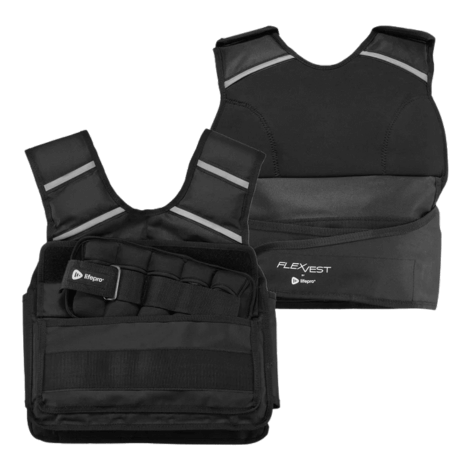
Product Highlights
-
The included weight bundles can double as adjustable ankle weights.
-
LifePro offers the FlexVest in Men’s (5-20 lbs) and Women’s (5-15 lbs) size options.
-
The FlexVest’s durable exterior also features reflective strips for staying visible in low light.
-
You can often find the LifePro Weighted FlexVest with Ankle Weights at a discount online.
Pros & Cons
Pros
- Stays in place during runs
- Removable weight bundles
- Available in multiple weight totals
- Budget-friendly price tag
- Lifetime warranty
Cons
- Material isn’t exactly sweat-resistant, per our tester
- Unable to make microadjustments to weight total
Bottom Line
The FlexVest from LifePro can be an excellent weight vest for beginners given the weight bundles can double as ankle weights. Plus, we appreciate the comfortable, durable fabric that keeps this profile in-place during movements.
Best Weighted Vest for Walking: Fringe Sport WODMaster Weight Vest
Good for: Anyone who values mobility more than weight and wants something comfortable to wear for long periods of time
Best Weighted Vest for Walking
Fringe Sport WODmaster Weight Vest
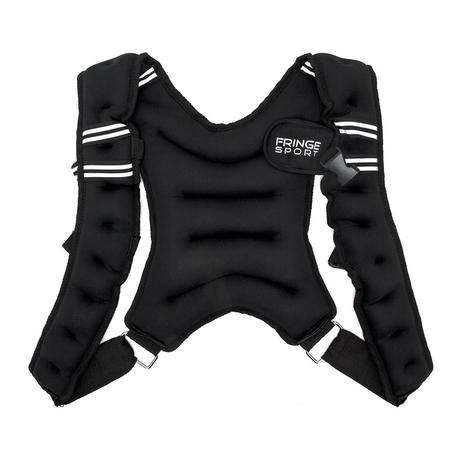
Product Highlights
- 6 points of adjustment
- Weight is fixed at 20 lbs
- Has reflective stripes on front and back for night workouts
Pros & Cons
Pros
- Reflective stripes for night workouts
- 6 points of adjustment
- Costs under $100 for 20-lb vest
Cons
- Not made in the USA
- Only one color option
- Not the most snug fit
Bottom Line
The advantage of this vest is everything is secure and the vest has a much closer fit. It’s also a lot less expensive than others on the market.
Best Adjustable Weighted Vest: Rogue Plate Carrier
Good for: Everyone who wants a tactical-style weighted vest that’s been optimized for fitness training.
Best Overall Weight Vest
Rogue Plate Carrier
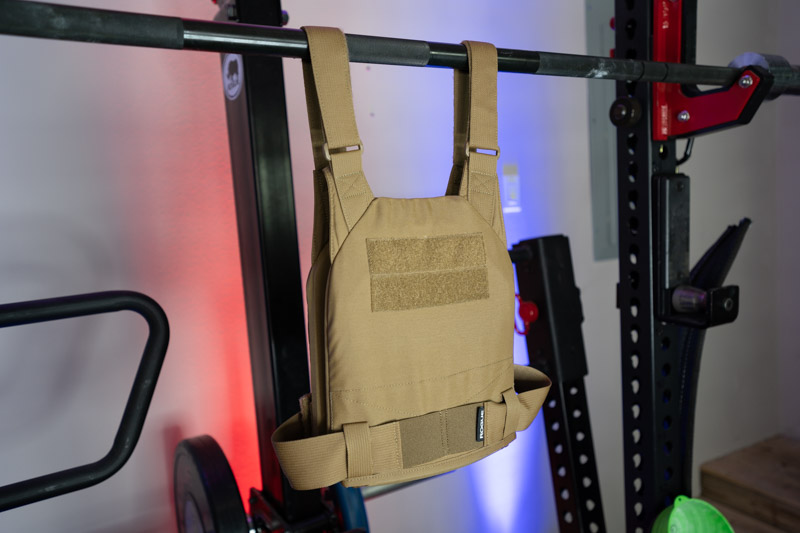
Product Highlights
- Designed specifically for use in functional fitness scenarios
- Very reasonably priced at around $130
- Durable but comfortable
Pros & Cons
Pros
- Designed specifically for use in functional fitness scenarios
- Made in the USA
- Very reasonably priced at around $130
- Durable but comfortable
Cons
- Could have thicker shoulder padding for long-term wear
- If you get the wrong size, it’ll definitely jostle while running (measure!)
- Steel plates sold separately
Bottom Line
The Rogue Plate Carrier is our best-rated weighted vest largely due to its value proposition.
Best Budget Weighted Vest: CAP Adjustable Weight Vest
Good for: People looking for a cheap vest they can use for a couple of years before upgrading
Best Budget Weighted Vest
CAP 20 LB Adjustable Weight Vest
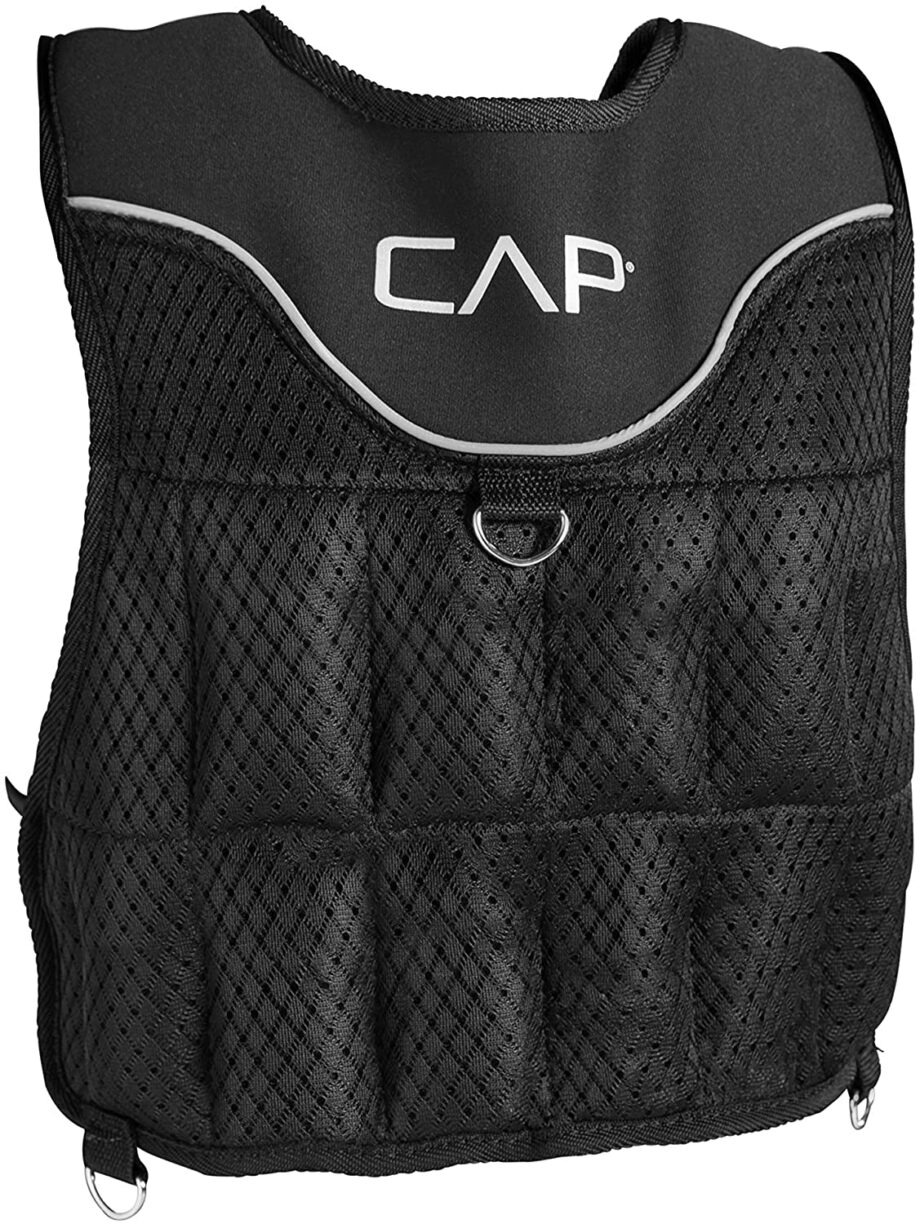
Product Highlights
- Adjustable conditioning vest with steel-shot weight packets, weighing approximately 0.75 lb
- Helps you gain strength and burn additional calories
- Adds up to 20 pounds of resistance
- Neoprene padding for comfort; Integrated pocket for cell phone
- The vest is made with breathable mesh with adjustable clips to match your body type.
Pros & Cons
Pros
- Delivered to your door for less than $50
- Relatively comfortable with a flexible fit
- Super entry-level option for people just starting out their home gyms
Cons
- Fabric rips easily
- You will need to upgrade after a year or two
- Uses sand instead of plates
Bottom Line
The cheapest adjustable weighted vest we recommend is the CAP Barbell Adjustable Weighted Vest, and we are somewhat wary of doing so. For the price, it’s a good value as it weighs in at 20 pounds and is shipped to your door for under $50.
Best Premium Weighted Vest: Omorpho G-Vest
Good for: Those looking for high-quality weighted clothing that also looks good
Best Premium Weighted Vest
OMORPHO G-Vest+
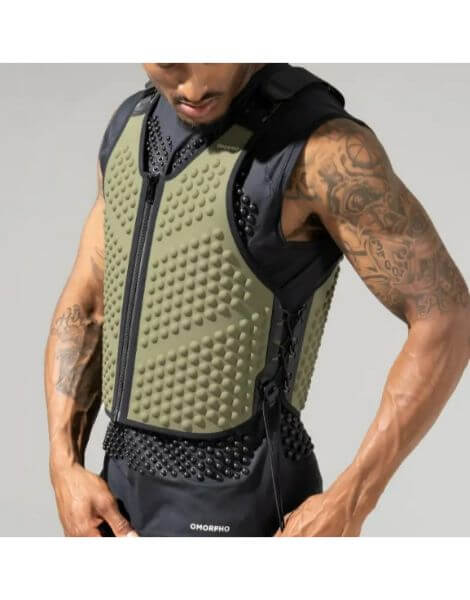
Product Highlights
- 5 color options
- Adjustable shoulder straps
- Easy to clean
- 2 sizes
- Designed to move with you
Pros & Cons
Pros
- Ventilated back and curved hem for a great fit without lowering mobility
- Great to add a challenge for a variety of workouts
- Much more comfortable to wear than other weighted clothing
- Designed to spread weight naturally across your body
Cons
- Might not be quite heavy enough depending on your training and fitness goals
- More expensive than many competitors’ vests
Bottom Line
The OMORPHO G-Vest+ provides you with a great way to give yourself an added challenge in any of your daily activities or exercise regimens. They also have an app that you can use to get workouts that have been specifically designed to provide you with the best training benefits with your vest.
Best Weighted Vest for Women: Hyperwear Hyper Vest Fit
Good for: People looking for a vest designed specifically to fit the female body
Best Weighted Vest for Women
Hyperwear Hyper Vest Fit
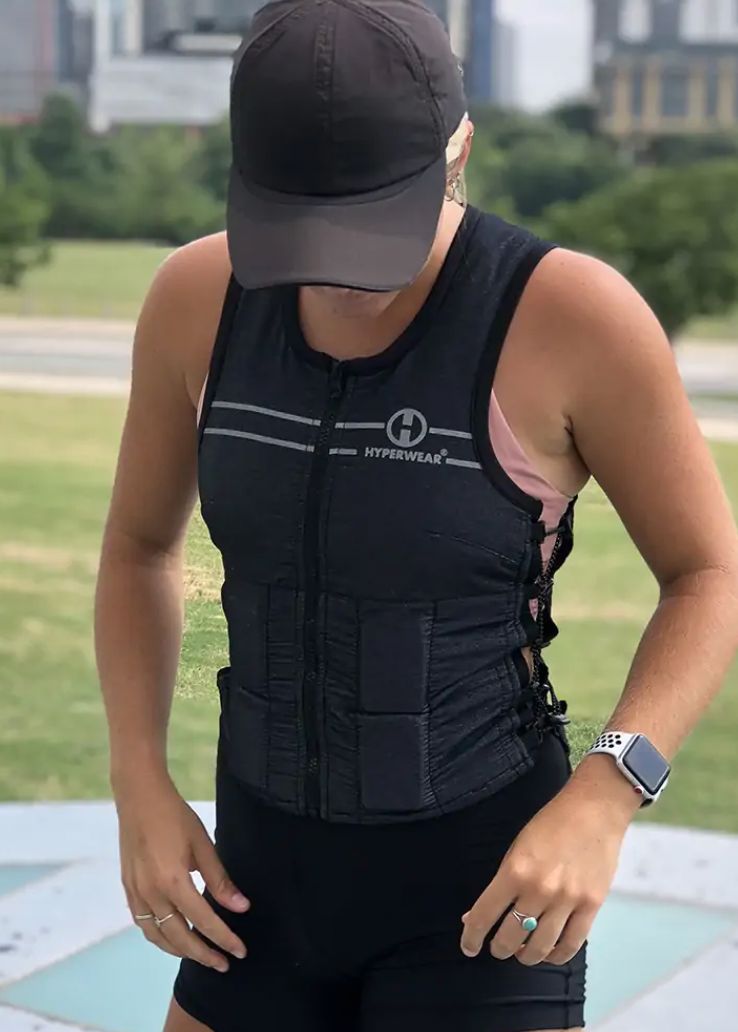
Product Highlights
- Patented design specifically for women
- Durable yet breathable Cordura fabric
- Adjustable up to 10 lbs
Pros & Cons
Pros
- Patented design for women
- Breathable construction
- Fitted design doesn’t jostle around during training
Cons
- Only goes up to 10 pounds
- Zipper closure is prone to damage over time
- Uses plastic-encased steel shot, not plates
Bottom Line
What we really like about this vest is its patented design for women, plus its durable construction and zero-bounce fit. Our reviewers found it comfortable to wear with an extremely breathable design.
Best Heavy Weighted Vest: Kensui EZ-VEST Plate-Loadable Weight Vest
Good for: People who need a weight vest heavier than 40 pounds
Best Heavy Weighted Vest
Kensui EZ-Vest
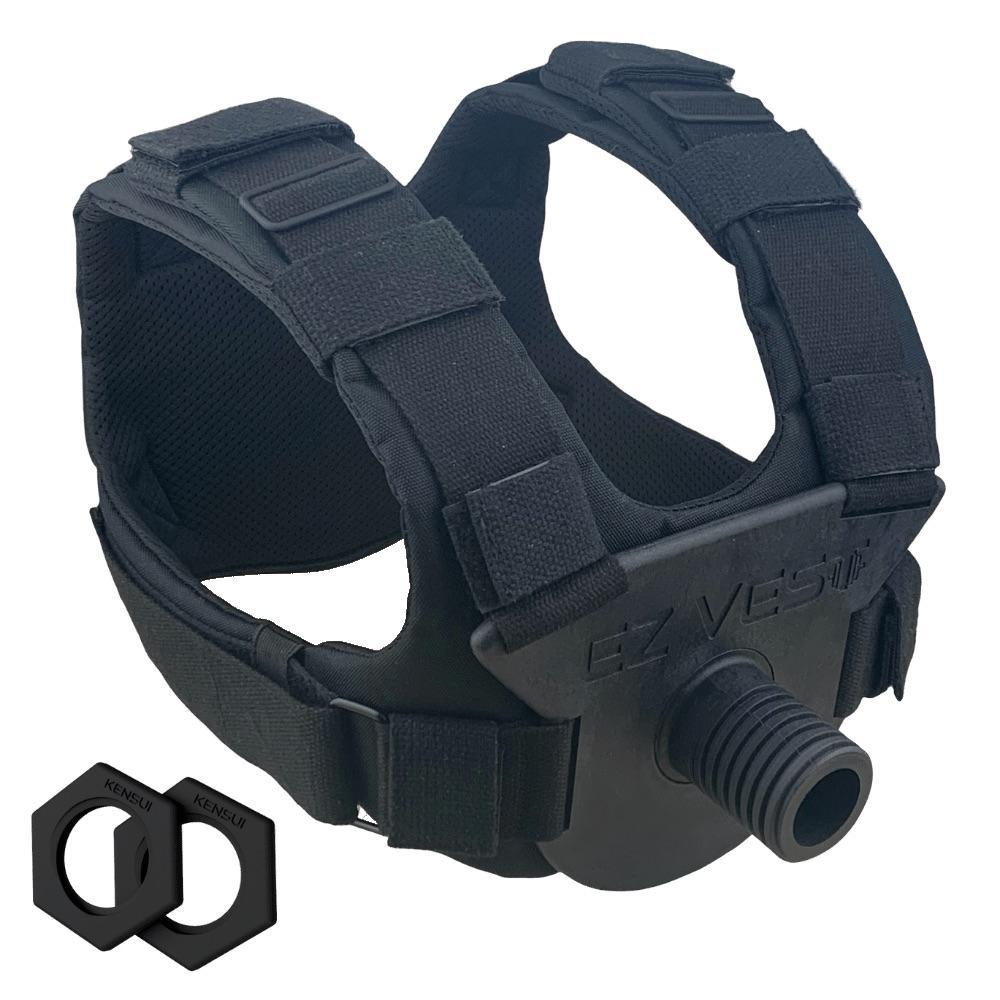
Product Highlights
- Loadable up to 225 pounds
- Unique Olympic plate-loaded design
- Great for straight-set weight training
- Less expensive than other vests because you don’t have to buy the steel separately
Pros & Cons
Pros
- Loadable up to 225 pounds
- Unique Olympic plate-loaded design
- Great for straight-set weight training
- Less expensive than other vests because you don’t have to buy the steel separately
Cons
- Can feel awkward to use at first
- Not ideal for CrossFit-style workouts or running
- Can get uncomfortable to wear as the weight gets higher
Bottom Line
If you’re looking for a weighted vest to use for more strength training than conditioning (or you’re just an absolute unit that can do Murph with more than 40 pounds on your torso), we recommend the Kensui EZ-VEST Weight Vest.
Other Weight Vests We Have Researched and Tested
Condor Sentry Plate Carrier: Although this isn’t the cheapest option (look at our ultra-budget pick for that) and it isn’t the highest quality either, the Condor Sentry Plate Carrier combines elements of the 5.11 TacTec Plate Carrier and Rogue Plate Carrier for a very reasonable price. I have a few qualms with the Condor Sentry: The straps on the side use buckles that can come loosened during training, and there have been quite a few reports of the buckles breaking. The yoke straps are too narrow for me, which causes discomfort and scraping on the neck. Also, there have been reports of the plates breaking through the nylon fabric. However, there are plenty of positive customer reviews, too.
North Gym Adjustable Weighted Vest: This was originally our pick for the best value weighted vest. Unfortunately, the price has increased significantly since the last iteration of this guide. We still love the North Gym Adjustable Weighted Vest, and we’d call it the best adjustable weighted vest, but the price is around the same as the Rogue Plate Carrier, which we feel is too expensive for the quality you get with the North Gym vest. The Condor Sentry Plate Carrier has replaced it as our value pick.
Hyperwear Hyper Vest PRO: This is basically the same as the Hyperwear Hyper Vest Elite, which I like, except the PRO is capped at 20 pounds.
Aduro Sport Weighted Vest: This is just like the Fringe Sport WODMaster weighted vest, but we don’t think the quality is up to par. In our experience and in reading other opinions and reviews, the steel shot that fills the vest falls out pretty quickly along the seams. In addition, with only one adjustment option, it can fit awkwardly on certain body types. Also, the vest isn’t adjustable. It’s inexpensive, but will ultimately disappoint over time.
RUNFast/Max Adjustable Weighted Vest: This was, at one point, a best seller on Amazon, likely because it’s available with up to 140 pounds of weight. That’s a massive amount for a sand-filled weighted vest. It’s clear that the materials used to make this vest are cheap and the sewing is poorly done, which means you won’t be enjoying 140 pounds of sand for very long.
miR Weighted Vest: The miR Weighted Vest is made by the same company that makes the RUNFast/Max. The miR is a very similar design, but made with better materials and is, therefore, more expensive. I like the design, but I haven’t had enough use with the vest to recommend it at this point. I will update when I do.
V-FORCE Weight Vests: V-FORCE is one of the original made-in-the-USA adjustable weight vest designs. They have a simple strapping system with an extremely high max weight that’s been copied the world over. I’d like more time with the vest before recommending it. I’ve used it and it didn’t feel as form-fitting as some of the other options, however, the weight options are high.
V-MAX Weight Vests: These are the same as V-FORCE but with a wider belt and different designs while costing more. Seems redundant.
BOX Weight Vests: Again, the same as the V-FORCE and V-MAX Vests but marketed towards CrossFit Athletes.
Titan Fitness Adjustable Weighted Vest: Although the weight is cast iron and they can go up against heavy, the vest itself is very cheap, uncomfortable, hard to breathe in, and the adjustment system is weak and simple. Just okay, although cheap.
Brute Force Operator Training Vest 2.0: I haven’t used this vest yet although the reviews give me an idea as does looking at the design. Appears to be high quality with good materials, but it doesn’t come with a weight and isn’t very breathable.
Invest Pro Weight Vest: I’ve had and been able to test and review the Invest Pro Weight Vest since it was released a couple of years ago. It’s a good vest, again, modeled after the 5.11 Tactical Vest, but doesn’t do anything better than the 5.11 vest except at a lower price. This vest is imported, however, compared to many of its competitors, it feels overpriced as many others have come to market. This vest does lack breathability as the sides have no way for airflow and there is a double velcro system that makes the vest secure, but also difficult to take off. You can see our full in-depth review of the Invest Pro Weight Vest for more information.
TRIBE WOD Weighted Vest: This is another vest designed after the 5.11. I haven’t used it, but it appears to be very similar to the North Gym Adjustable Weighted Vest, as they both use 600D nylon and are imported. The price on this is more expensive and I don’t like the side strap design, as I don’t think it will be as secure over the long term.
Cross101 Adjustable Weighted Vest: This is a decent budget-friendly option. It’s made by the same company that makes the miR Weighted Vests, but it’s a much cheaper design. The fit is pretty bad though, and most people will practically swim in the vest. The weights are also very cheap and use sand as the filler which will inevitably leak.
Benefits of Weighted Vests
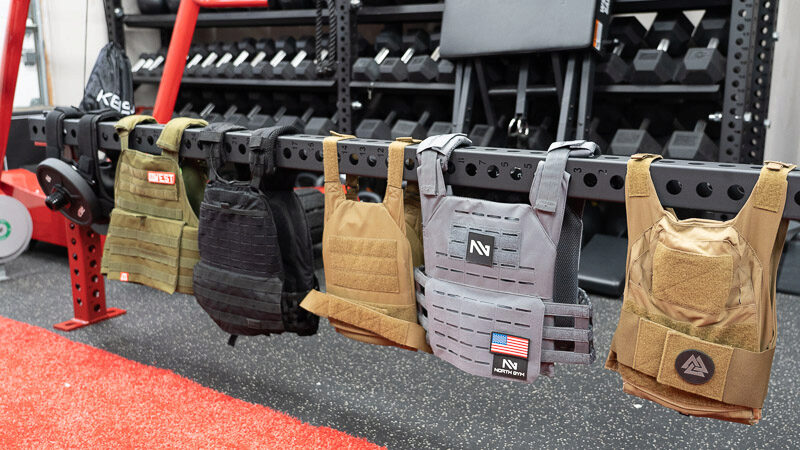
Wear a weighted vest during your workouts a few times a week and you’ll begin to notice the following benefits:
Cardiovascular Fitness
Weighted vests put stress on your respiratory muscles, which makes it slightly harder to breathe and therefore increases your heart rate. Over time, your heart will learn to get accustomed to the stress and become stronger, thereby increasing your overall cardiovascular fitness.
Stamina
Using a weighted vest during endurance training activities can help you go the distance when it’s race day. Running, walking, and hiking with a weighted vest increases your capacity to travel long distances under physical stress.
Strength
If you’re feeling stuck in your pull-ups, push-ups, or other calisthenic movements, try adding a weighted vest. You’ll initially have to lower your reps, but you’ll soon find that your bodyweight strength has increased.
Muscular Endurance
Muscular endurance refers to how long your muscles can sustain repeated contractions under a given load. In other words, how many air squats you can do without giving up due to lactic acid buildup or succumbing to muscle failure. Wearing a weight vest for exercises like squats, pull-ups, and push-ups trains your body to do more reps with more weight—so when you take that vest off, you’ll feel like Superman.
What to Consider Before Buying a Weighted Vest
Before you buy a weighted vest, consider these factors to choose the best one for you.
Primary Use
As with most items that you plan to fill your home gym with, I recommend taking a look at the movements you most often do. Do you do a lot of running or quick, explosive movements? Then you’ll want a vest that you can use for those purposes without flopping around. However, if you do more pull-ups and dips than sprints and longer distance runs, then a vest that has the capability of getting heavy may be a better option.
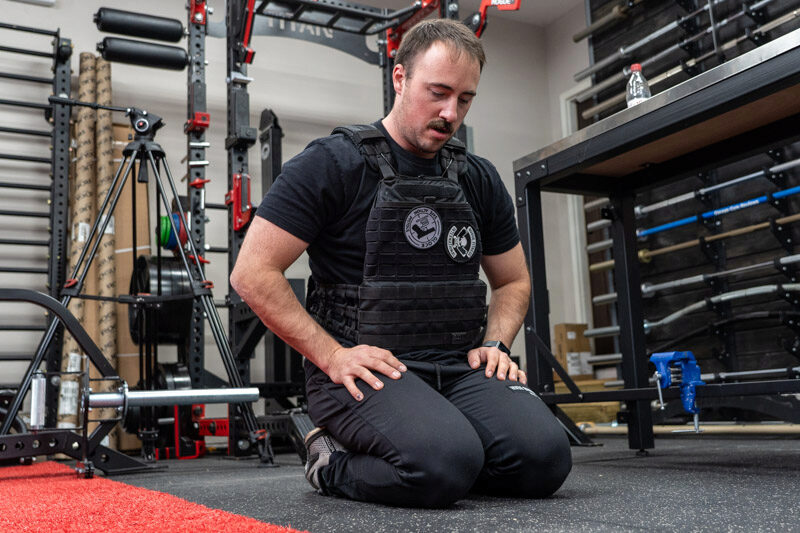
Here’s the thing: there are vests that can do it all. However, they often lack in some areas if they can do everything. For instance, a vest that can get heavy and be used for running is often time-intensive to adjust the weight and won’t feel very secure during runs. This is why for most people, we suggest a vest that isn’t crazy heavy but instead can add 20 pounds or so to your body weight as it will feel the most comfortable and be the most versatile.
Size
This goes hand-in-hand with the primary use you need a vest for. Tighter fits tend to be better for running, jumping, and other bouncy movements. You probably don’t need something fitted if you only plan on using your weighted vest for pull-ups, squats, lunges, and the like.
Construction and Durability
Look at what the vest is made of and what you plan to use if for. Materials like Cordura and other heavy-duty nylon blends are best if you plan to put your weighted vest through intense workouts and expose it to the outdoor elements. Some higher-end weighted vests have thin water-resistant coatings for extra durability. Analyze the closure systems, too: Does it use buckles, straps, or velcro, and will the specific closure system serve your needs?
RELATED: Outdoor Training Guide
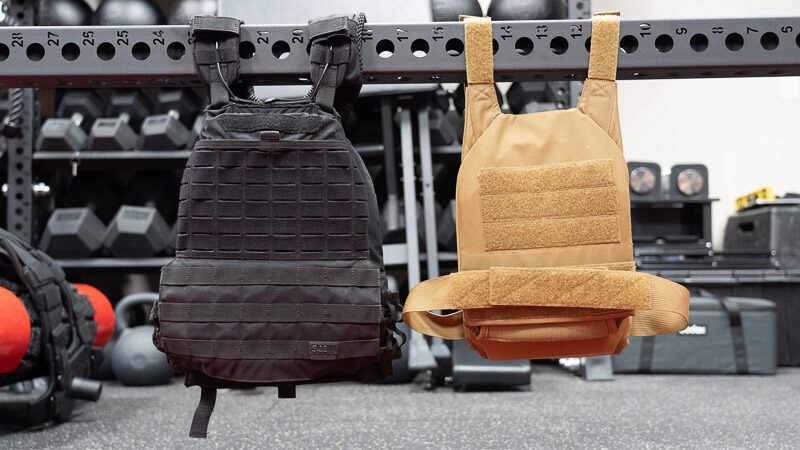
Check to see if you can take the vest apart for washing it, and if you can toss it in the washing machine or if it must be hand-washed.
Finally, check for any extra features you may want. Do you want a mesh pocket for storage, or maybe even a bottle holder? Some next-level weighted vests come with those cool features, but you’ll probably pay a premium.
Proper Weight
On average, weighted vests range from 10 to 40 pounds. However, some vests go heavier, such as the Kensui EZ-VEST we recommend. Most people don’t need or want a weighted vest heavier than 40 pounds, but it all depends on your fitness level and how you want to use the vest.
Fit
A weighted vest should fit like a good shirt: Not too tight, not too loose. You’ll want it to be secure as you move around during your workout, but not so tight that it restricts movements.
Loading
Some people may prefer a back-loaded weighted vest over one where the weight sits on your chest, and others may prefer a plate-loaded vest over one that’s pre-loaded. Find one that works for your workout needs.
Type of Weights
Different vests are compatible with different kinds of weights. Most of the weighted vests we recommend use steel or iron plates, but others use bags of sand or steel shot. Some unique vests, such as the Hyperwear models, use miniature steel plates that are about the size of Pez dispensers. Factors such as budget and primary use will determine which type of weighted vest is best for you.
Aesthetics
Don’t fall into the trap of buying the coolest-looking weighted vest. Seriously, the looks of the vest are secondary to the function and feel of the vest (and this rings true for pretty much all of the best home gym equipment.) But we still recognize that aesthetics are important to most people, and most want a vest that looks cool. So don’t buy one you hate the look of, but don’t base your entire decision around style alone.
Budget
Of course, budget plays a huge role in purchasing decisions. That’s why we’ve provided a comprehensive list of the best weighted vests in different price ranges.
How We Picked the Vests
Any fitness product that doesn’t require an entire room to be used (i.e. a squat rack) and can be had for those on even the most strict budgets will have many companies selling their own version.
There are many weighted vests on the market, especially with the continued interest in working out at home. However, there are not as many different types of vests as you’d guess after doing a quick Google search. The fact of the matter is, despite all of the brands selling weighted vests, many of them are using the same manufacturers and designs and are simply having their logo placed on the product. This happens a lot in the fitness industry; barbells are notorious for it.
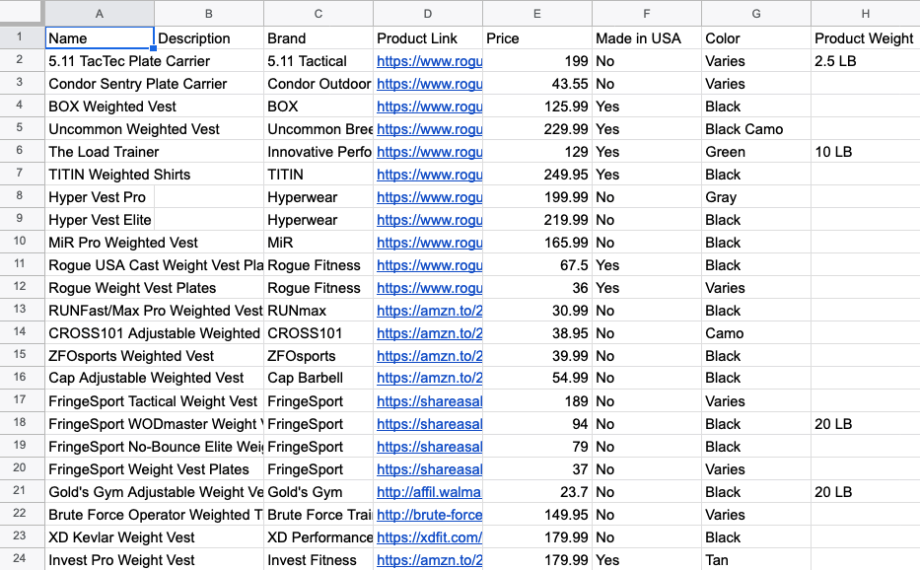
So, what we did was first take stock of what we had on hand in both my home gym and my personal training studio. Turns out we had more than 10 different models already from doing various reviews over the years.
I then began to scour manufacturers’ websites to see what was available that I wasn’t aware of. When I found a vest that was a unique design or one I hadn’t used, I bought it and we began throwing it in workouts to see how it felt.
In total we found over 50 different weight vests being sold by companies, but not nearly as many unique designs. The versions we brought in-house for testing were ones we had either prior experience with, looked intriguing, or we had been asked to review it.
In an effort to provide a wide variety of weighted vests, we also took a couple of things into consideration.
- Material: Were these vests made of durable material that could not only support the weight, but wouldn’t tear mid-workout?
- Design: How did the vests look and feel? And were they comfortable?
- Loading: How were the weights distributed on the vests? And could you add more weight if you wanted?
How We Tested the Weight Vests
Once we narrowed down the weight vests to the ones that we felt were worth paying some attention to, we ran them through various workouts.
Depending on what its use case is, a weight vest should perform differently.
For the vests we thought were more suitable for a heavyweight, we loaded them up to their maximum suggested weight (and often more) to see how they felt. In addition, we would jump (as much as we could with a few hundred pounds on the vest,) run, bound, and just overall shake to see how if the weight stayed secure and tight to the body.
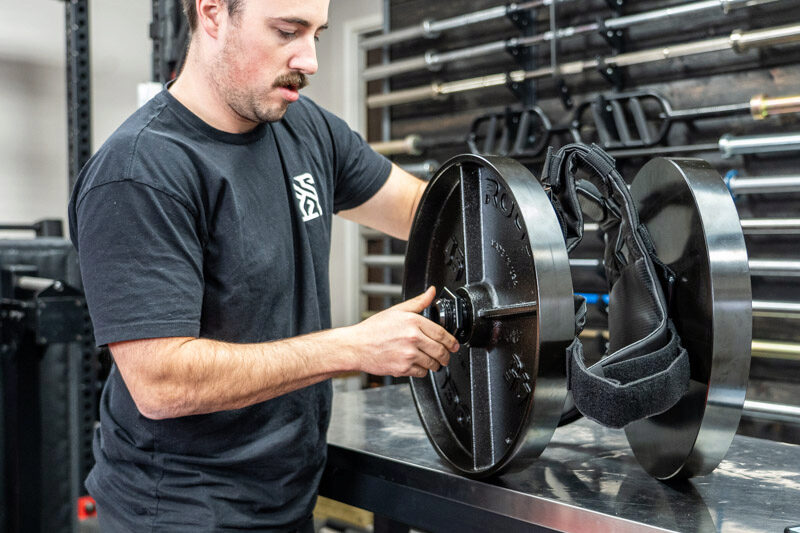
Most of the weight vests use velcro as the securitization system, so we tested how many times we could place and pull the velcro tabs apart to see how many it would take before we found a noticeable change in the holding power.
For the vests designed to be used for most everything, we used them for almost everything. We put them on for runs, used them in workouts that they’re really designed for, like Murph, as well various bodyweight workouts such as push-ups, squats, pull-ups, and box jumps.
Lastly, we weighed the vests and their weight plates (if they came included) for accuracy to their stated weight as we do with all of our barbell and weighted plates.
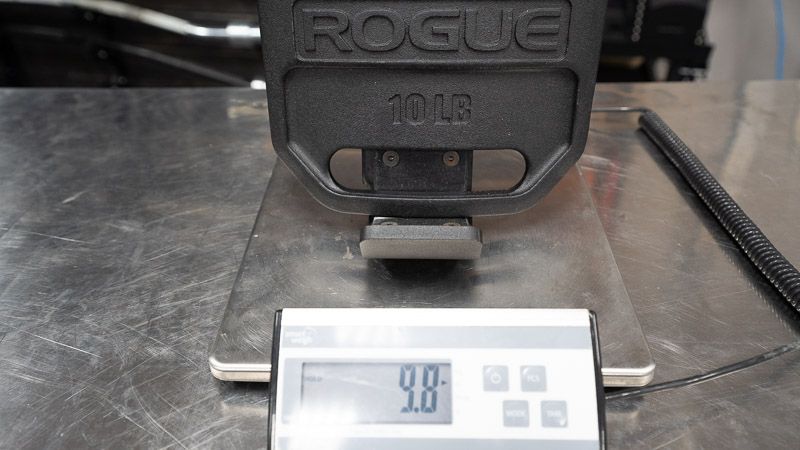
Best Weighted Vests: FAQs
How heavy should a weighted vest be?
For men, I usually suggest a vest that adjusts up to 20 pounds, as that’s the weight used in most CrossFit workouts. For women, the typical prescribed weight is 14 pounds. The most important thing is to buy an adjustable vest that allows you to add additional weight over time. For example, if you’re new to fitness, choose a vest that ranges from 10 to 20 pounds. That way you can add extra weight as your fitness improves.
What plates do you recommend for weight vests?
If you want weight vest plates made in the US, the Rogue USA Cast Weight Vest Plates feature a fantastic shape that wraps around the body. If you want the best value, the WOLF TACTICAL Vest Plates are a good option.
What is the best brand of weight vest?
Which brand of weighted vest will suit you best will depend on a number of factors—namely, your fitness levels and goals, the vest’s intended use, and your budget.
Rogue is a very popular brand with a great plate carrier; TacTec also is a popular brand, specifically for tactical vests that double as plate carriers. If you’re into rucking and long-distance hiking with a weighted vest, I like GORUCK. CAP Barbell has great budget options, and for a vest that can get heavy, I like to suggest the Kensui EZ-Vest.
Are weighted vests worth it?
Weighted vests can certainly add a challenge to your next bodyweight workout. The added weight takes a cardio-focused movement like running, or bodyweight movements like push-ups or pull-ups, and transforms them into resistance training. A 2021 review1 demonstrated that weightlifting and resistance training improved sprint times, vertical jumps, and maximal strength lifts in athletes.
What are the negatives of weighted vests?
While weighted vests can be a great addition to workouts, there are a couple of things to watch out for. For one, the added weight can increase the stress on your joints, especially in bounding movements like running. Anyone with joint issues in their back or knees may want to avoid these types of movements with a weighted vest.
Another thing to be mindful of is making sure the weighted vest has a good fit. Odd fits or vests that are too large can shift and move, causing excessive stress on your body and joints. Making sure your vest fits properly will minimize any shifting during your workout.
References
- García-Valverde, A., Manresa-Rocamora, A., Hernández-Davó, J. L., & Sabido, R. (2022). Effect of weightlifting training on jumping ability, sprinting performance and squat strength: A systematic review and meta-analysis. International Journal of Sports Science & Coaching, 17(4), 917-939. https://doi.org/10.1177/17479541211061695

